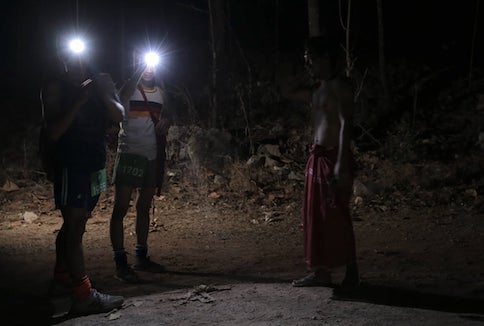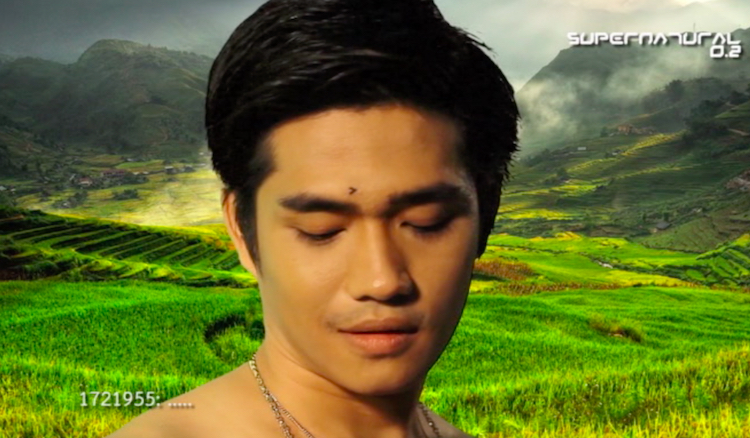
“Thunska who makes everything sexy.”
“But I’m talking about death in this one.”
“But I’m talking about death in this one.”
From Eros to Thanatos: Danse Macabre (มรณสติ) begins with director Thunska Pansittivorakul explaining to a dance choreographer that his new documentary explores darker territory. Unlike his last film, the sexually frank Avalon (แดนศักดิ์สิทธิ์), Danse Macabre juxtaposes accounts of violent deaths with interpretive dance routines.
The film was codirected by Phassarawin Kulsomboon, and will have its world premiere at the Doclisboa film festival in Lisbon on 27th October. Thunska’s Santikhiri Sonata (สันติคีรี โซนาตา) was named best film at Doclisboa in 2019.
As the proverb says, death is the great leveller. But in Thailand, one of the world’s most unequal societies, not even death can rupture the social hierarchy. Danse Macabre highlights the disparity between the deaths of royals and commoners: kings receive lavish state funerals followed by prolonged periods of national mourning, whereas murder victims become objects of public spectacle as undignified crowds of gawping onlookers gather freely at crime scenes.
The starkest contrast is that between King Rama VIII (who died from a bullet wound in 1946) and Porlajee Rakchongcharoen (a human rights activist who was murdered in 2014). The King’s corpse was placed in a golden urn atop a gilded chariot. Porlajee’s body, however, was stuffed unceremoniously into an oil drum. (Pin Sasao’s installation ถังแดง — ‘red barrel’ — also addresses Porlajee’s murder.)
In Thunska’s documentary Homogeneous, Empty Time (สุญกาล), one interviewee mentions “soldiers getting beaten to death during training” and shortly after that film was completed, army cadet Phakhapong Tanyakan died during a training exercise. Danse Macabre has an equally tragic topicality: on 20th July, just a few days after the rough cut was finished, three people dropped dead on the streets of Bangkok, and their bodies were left in situ for hours. (Thunska added an epilogue highlighting these recent cases.)
Danse Macabre also deals with Thai state violence, from the massacres of October 1976 — also covered in The Terrorists (ผู้ก่อการร้าย) — May 1992, and May 2010, to the recent student protests. Footage of riot police firing water cannon last year is cut to the beat of the Subtitle Project’s song Remember. The track’s Thai title, วน, literally translates as ‘loop’, indicating the cyclical nature of violent state oppression. (Thunska directed the music video for Remember when it was released as a single.)
The film was codirected by Phassarawin Kulsomboon, and will have its world premiere at the Doclisboa film festival in Lisbon on 27th October. Thunska’s Santikhiri Sonata (สันติคีรี โซนาตา) was named best film at Doclisboa in 2019.
As the proverb says, death is the great leveller. But in Thailand, one of the world’s most unequal societies, not even death can rupture the social hierarchy. Danse Macabre highlights the disparity between the deaths of royals and commoners: kings receive lavish state funerals followed by prolonged periods of national mourning, whereas murder victims become objects of public spectacle as undignified crowds of gawping onlookers gather freely at crime scenes.
The starkest contrast is that between King Rama VIII (who died from a bullet wound in 1946) and Porlajee Rakchongcharoen (a human rights activist who was murdered in 2014). The King’s corpse was placed in a golden urn atop a gilded chariot. Porlajee’s body, however, was stuffed unceremoniously into an oil drum. (Pin Sasao’s installation ถังแดง — ‘red barrel’ — also addresses Porlajee’s murder.)
In Thunska’s documentary Homogeneous, Empty Time (สุญกาล), one interviewee mentions “soldiers getting beaten to death during training” and shortly after that film was completed, army cadet Phakhapong Tanyakan died during a training exercise. Danse Macabre has an equally tragic topicality: on 20th July, just a few days after the rough cut was finished, three people dropped dead on the streets of Bangkok, and their bodies were left in situ for hours. (Thunska added an epilogue highlighting these recent cases.)
Danse Macabre also deals with Thai state violence, from the massacres of October 1976 — also covered in The Terrorists (ผู้ก่อการร้าย) — May 1992, and May 2010, to the recent student protests. Footage of riot police firing water cannon last year is cut to the beat of the Subtitle Project’s song Remember. The track’s Thai title, วน, literally translates as ‘loop’, indicating the cyclical nature of violent state oppression. (Thunska directed the music video for Remember when it was released as a single.)



Like Thunska’s Reincarnate (จุติ), Danse Macabre begins with a written prologue explaining the Thai law under which “a film may be banned as unsuitable for public exhibition” and then proceeds to deliberately flout those rules. I interviewed Thunska about this law for Thai Cinema Uncensored, and one of his early features, This Area is Under Quarantine (บริเวณนี้อยู่ภายใต้การกักกัน), was the first film to fall foul of it. Thunska uses explicit sexual content as a political commentary in many films, and Danse Macabre is no exception: it includes photos from vintage porn magazines to show how Thailand has since become more culturally — and, by implication, politically — conservative.
Even more provocatively, the indirect allusions to the monarchy in his sci-fi dystopia Supernatural (เหนือธรรมชาติ) are replaced by a direct account of modern Thai royal history, including a subliminal image hinting at an explanation for the death of Rama VIII. Three men were executed for the King’s murder on 17th February 1955, and coded references to that date appear in Danse Macabre, Supernatural, and the Remember music video.
Even more provocatively, the indirect allusions to the monarchy in his sci-fi dystopia Supernatural (เหนือธรรมชาติ) are replaced by a direct account of modern Thai royal history, including a subliminal image hinting at an explanation for the death of Rama VIII. Three men were executed for the King’s murder on 17th February 1955, and coded references to that date appear in Danse Macabre, Supernatural, and the Remember music video.
